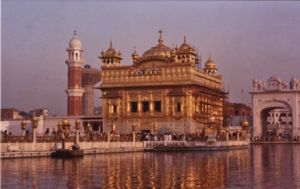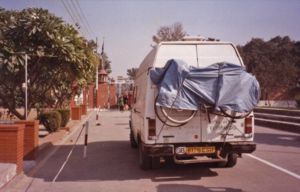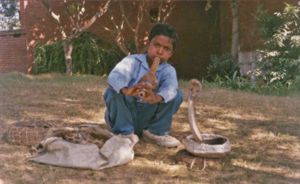
The Golden Temple in Amritsar was high on our list of
‘Not to be missed’ and having found a small guest house car park to spend the night in our camper, we spent the rest of the day looking around the beautiful Sikh Temple. Built in the 16thC the Temple stands in a ‘tank’ (or pool) of constantly changing fresh water, called ‘Amritsar,’ meaning “tank of nectar or immortality,” and although the water didn’t look that fresh to us, it was home to some huge fish. The Sikhs welcome and encourage everyone to spend at least 3 days in the calm and thought-provoking atmosphere of the Temple grounds, and offer a free bed and food. The Golden Temple is affectionately named because of its complete covering of gold leaf, which is said to weigh many tons. Glass boxes are placed around the grounds for visitors to donate any unwanted gold towards ongoing restoration.
Instead of walking back to our camper, we decided to flag down our first cycle rickshaw. Our peddler was old and thin and should have been taking life easy. He wore a cut of worn out material wound around and tucked precariously around his waist and legs and on his feet were what looked like remnants of plastic flip flops. Slung over his shoulder was another length of material, which he used to periodically to mop his sweating brow.
‘Tourist Guest House, near the railway.’ We told him.
‘OK.’ Came the reply, with the customary waggle of the head. We assumed that he knew what he was doing! We gingerly climbed aboard the rather rickety rickshaw and set off amongst the hustle and bustle of Amritsar traffic. We passed cart stalls selling all manner of items, linen shops, restaurants, hardware shops, and sari shops. We dodged around cows with a death wish, wandering aimlessly amongst the manic traffic. Motor rickshaw drivers who weaved all over the road, and buses whose capacity for passengers seemed limitless, with ‘hanger’s on’ taking things a bit too far. We pulled alongside one bus and just missed one of the passengers as she scrambled to a window, just in time to poke her head out and vomit down the side of the bus! Thankfully, she missed us, but caught someone else.
One shop caught my eye “Le Pâtisserie” which sold an array of interesting pastries. Our peddler was working hard and seemed to know all the short cuts, weaving, ducking and diving through the narrow jumble of busy streets. He continued peddling once more passing “Le Pâtisserie.”
‘That’s the second time I’ve seen that shop.’ I commented to Alan. We both sat there silent trying to soak up the assault of sights, smells and sounds coming from all directions. Some minutes later, after much peddling and brow mopping,
‘That’s the third time I’ve seen “Le Pâtisserie.”’ I told Alan, this time poking him to make sure he took notice of my observations. Alan had had enough. We had been on a 20-minute ride to cover what was only a 5-minute walk!
‘We are just going round in bloody circles.’ Said Alan, as he lent forward to tap on the shoulder of what was becoming an increasingly tired and dizzy rickshaw peddler. ‘I’ve had enough of going round in circles. You don’t know what you are doing.’ A heated exchange was now taking place, with neither party understanding the other, amidst a gathering crowd who seemed to think the incident most amusing. I rather fancy that the cycle rickshaw peddler was on a bet. A bet that he could take some foreigners around a said circuit at least three times before they noticed.

One day in Amritsar we had a puncture, but it was no problem, as within sight was a puncture repairman. He sat on his hunches outside his dilapidated wooden hut surrounded by old tyres, blown up inner tubes, a water bath and a past its best compressor. He didn’t understand any English, so we pointed to our flat tyre and pointed to the tyre man to fix it. Surely it would be obvious to understand what we wanted, wouldn’t it? No, he just sat there waggling his head. We tried again, but to no avail. A passer by who had overheard, shouted something to him, where upon he jumped into action and mended our puncture, by
sewing a patch on the sidewall of the tyre. The tyre man’s neighbours had offered us some tea, though something a little stronger would have helped to soften the blow of watching our brand new tyre being assaulted with needle and thread. Alan gave the tyre man another job. He showed him how to check the tyre pressures with our fancy digital pressure gauge and told him what pressure was needed all round and left him to it while we finished our teas. 10 minutes later tyres all pumped and teas finished, we set off on the road again, but the ride was so bumpy that it was making me feel very sick. It had to be the tyres, so we stopped to check them out. They were supposed to be 50psi, but each and every tyre was a different pressure, with readings ranging from 25psi to 85psi! This was India where everything was no problem, which would test your patience to its limits. We managed to deflate the tyres as necessary and the patch lasted the 11,000 miles back to England without any problems. But when we took our Sherpa for its MoT test back in England, the tester almost had a heart attack when he saw the patch.
‘Get that tyre off straight away. It’s very dangerous and could blow at any minute.’
‘Yeh, sure.’ We told him in a chilled out sort of way. ‘No problem!’

One afternoon, whilst driving the trunk road we stopped at some roadside services. Not the sort of sanitized services we have in the UK, but large and clean with plenty of parking spaces. Next to where we parked was a young Indian snake charmer, who was perhaps no more than 8 years old and was charming a real cobra with a wooden flute. As I knelt down to get a good photo, the snake turned and swayed in my direction. It was time to go.
On the Aires was a large well furnished restaurant, which boasted a tasty menu. We went in and sat down and thought it odd that we were the only customers in what was a very busy Aires. The waiter came and gave Alan a menu and ignored me. We made our order of chicken and rice, and 2 cold coffees with ice cream, then sat and waited. The waiter returned and told us that he didn’t have chicken and rice, so we ordered something else.
‘No sir. We don’t have that either.’ So we ordered another dish.
The waiter came with 2 vanilla milkshakes and to tell us that he didn’t have the last dish we ordered either.
‘Well what do you have?’ Asked Alan as he sipped his vanilla milkshake. ‘And what is this?’
‘That is vanilla milkshake sir.’ Answered the waiter.
‘But I didn’t order vanilla milkshake, I ordered cold coffee and ice cream.’
The waiter looked at Alan with such a shocked expression and added.
‘What’s the matter? Don’t you like vanilla milk shake?’
We were confronted with experiences like this throughout India, every day, which tested your limits of endurance, and pushed you, even if you didn’t want to go there to the very edge. If you were the type to get stressed and hot under the collar for anything that threatened to ruin the smooth running of your day, you would be very sadly disappointed in India, for India is like an unsolved puzzle. You will never be able to make sense of it, however hard you try. A seemingly chaotic order applies, which will always defeat your efforts of logic to beat it. India changes the way you think, and the way you live your life forever. The most striking difference is that Indians are accepting of their lot in life. A tea boy seems to take great pride in making and delivering tea to other thirsty people. He realises that his job is important and a welcome addition to others in their day. In the West making tea would be seen as a lowly job and not worthy of any respect. In India it is a vital job, the refusal of which could bring the country to its knees. We westerners can never accept how we are. We are always striving for bigger, better and more, regardless of the cost to others, the mark of a capitalist society. Paradoxically, the majority of Indians have little or nothing compared to us, yet they are disproportionately happier than us. This is the puzzle westerners have yet to solve.











